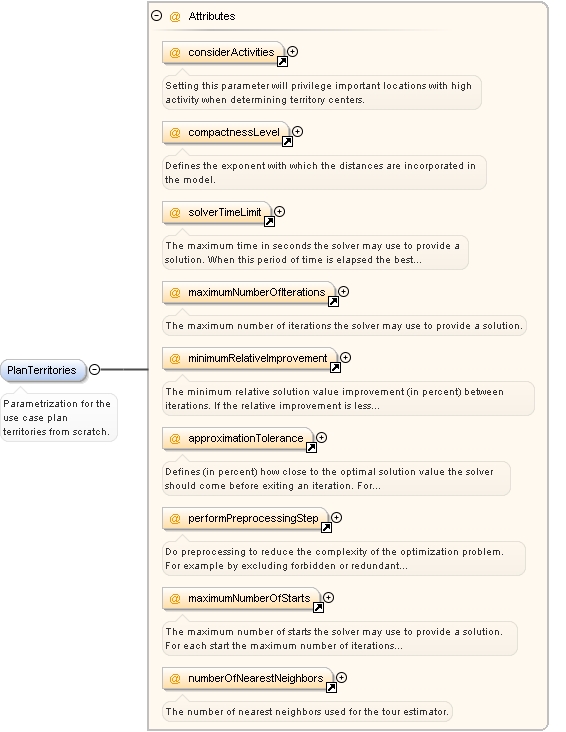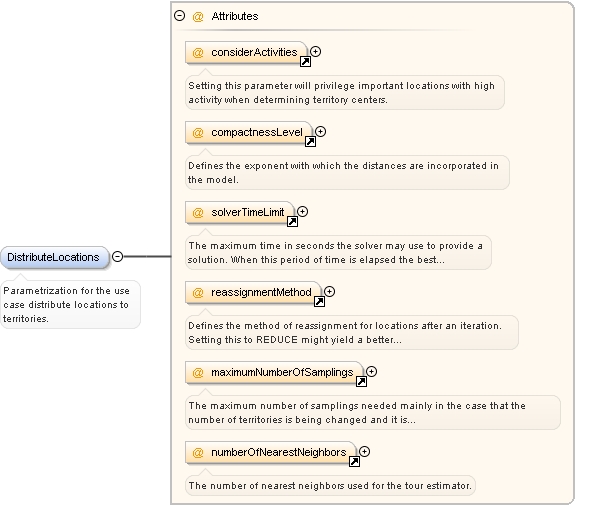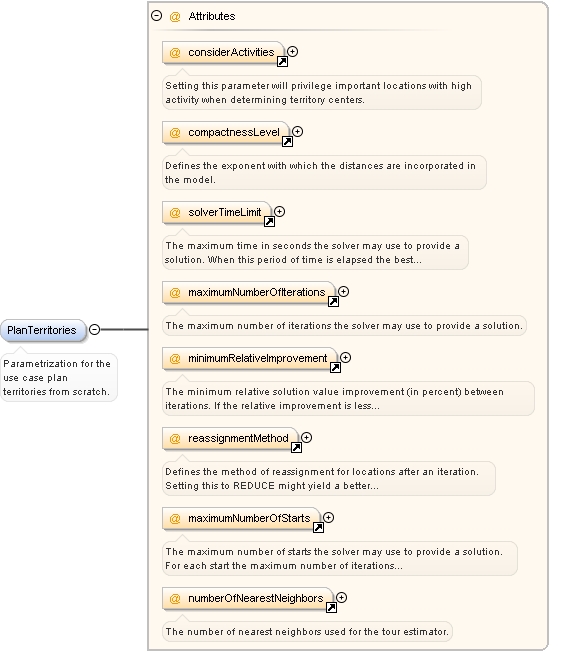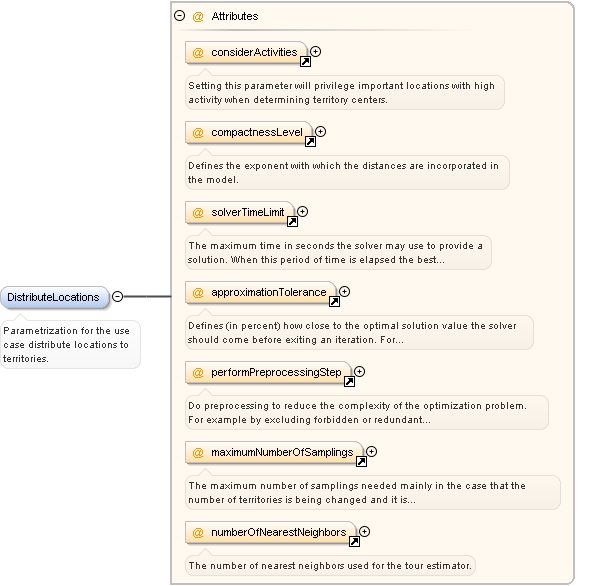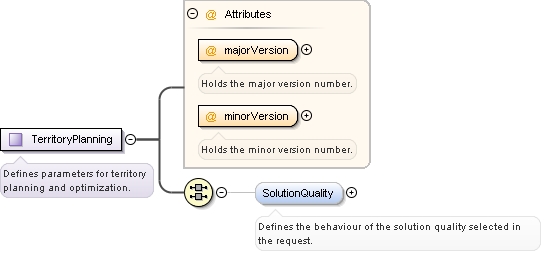Included schema TerritoryPlanning.xsd
|
|
|
|
| Namespace |
No namespace |
|
Properties
|
| attribute form default:
|
unqualified |
| element form default:
|
qualified |
|
|
|
|
|
|
|
|
|
|
| Namespace |
No namespace |
|
Diagram
|
|
|
Properties
|
| content:
|
complex |
| minOccurs:
|
0 |
|
| Model |
ALL(PlanTerritories{0,1} DistributeLocations{0,1})
|
| Children |
DistributeLocations, PlanTerritories |
|
Instance
|
<HighSolutionQuality>
<PlanTerritories approximationTolerance="" compactnessLevel="" considerActivities="" maximumNumberOfIterations="" maximumNumberOfStarts="" minimumRelativeImprovement="" numberOfNearestNeighbors="" performPreprocessingStep="" solverTimeLimit="">{0,1}</PlanTerritories>
<DistributeLocations approximationTolerance="" compactnessLevel="" considerActivities="" maximumNumberOfSamplings="" numberOfNearestNeighbors="" performPreprocessingStep="" solverTimeLimit="">{0,1}</DistributeLocations>
</HighSolutionQuality> |
|
|
|
|
|
|
|
|
|
|
| Namespace |
No namespace |
|
Annotations
|
Parametrization for the use case plan territories from scratch. |
|
|
Diagram
|
|
|
Properties
|
| content:
|
complex |
| minOccurs:
|
0 |
|
|
Attributes
|
| QName |
Type |
Fixed |
Default |
Use |
Annotation |
| approximationTolerance |
restriction of xs:double |
|
|
optional |
Defines (in percent) how close to the optimal solution value the solver should come before exiting an iteration. For instance, compared to 10% the value of 5% means better solution at the cost of higher running time. |
|
| compactnessLevel |
restriction of xs:positiveInteger |
|
|
optional |
Defines the exponent with which the distances are incorporated in the model. |
|
| considerActivities |
xs:boolean |
|
|
optional |
Setting this parameter will privilege important locations with high activity when determining territory centers. |
|
| maximumNumberOfIterations |
xs:positiveInteger |
|
|
optional |
The maximum number of iterations the solver may use to provide a solution. |
|
| maximumNumberOfStarts |
xs:positiveInteger |
|
|
optional |
The maximum number of starts the solver may use to provide a solution. For each start the maximum number of iterations mentioned in this profile will be used. |
|
| minimumRelativeImprovement |
restriction of xs:double |
|
|
optional |
The minimum relative solution value improvement (in percent) between iterations. If the relative improvement is less than the given value, no further iterations will be performed. |
|
| numberOfNearestNeighbors |
restriction of xs:positiveInteger |
|
|
optional |
The number of nearest neighbors used for the tour estimator. |
|
| performPreprocessingStep |
xs:boolean |
|
|
optional |
Do preprocessing to reduce the complexity of the optimization problem. For example by excluding forbidden or redundant combinations. |
|
| solverTimeLimit |
xs:positiveInteger |
|
|
optional |
The maximum time in seconds the solver may use to provide a solution. When this period of time is elapsed the best solution available will be returned. |
|
|
|
|
|
|
|
|
|
|
|
| Namespace |
No namespace |
|
Annotations
|
Parametrization for the use case distribute locations to territories. |
|
|
Diagram
|
|
|
Properties
|
| content:
|
complex |
| minOccurs:
|
0 |
|
|
Attributes
|
| QName |
Type |
Fixed |
Default |
Use |
Annotation |
| approximationTolerance |
restriction of xs:double |
|
|
optional |
Defines (in percent) how close to the optimal solution value the solver should come before exiting an iteration. For instance, compared to 10% the value of 5% means better solution at the cost of higher running time. |
|
| compactnessLevel |
restriction of xs:positiveInteger |
|
|
optional |
Defines the exponent with which the distances are incorporated in the model. |
|
| considerActivities |
xs:boolean |
|
|
optional |
Setting this parameter will privilege important locations with high activity when determining territory centers. |
|
| maximumNumberOfSamplings |
xs:positiveInteger |
|
|
optional |
The maximum number of samplings needed mainly in the case that the number of territories is being changed and it is required to choose some "territory centers" from a given list. |
|
| numberOfNearestNeighbors |
restriction of xs:positiveInteger |
|
|
optional |
The number of nearest neighbors used for the tour estimator. |
|
| performPreprocessingStep |
xs:boolean |
|
|
optional |
Do preprocessing to reduce the complexity of the optimization problem. For example by excluding forbidden or redundant combinations. |
|
| solverTimeLimit |
xs:positiveInteger |
|
|
optional |
The maximum time in seconds the solver may use to provide a solution. When this period of time is elapsed the best solution available will be returned. |
|
|
|
|
|
|
|
|
|
|
|
| Namespace |
No namespace |
|
Diagram
|
|
|
Properties
|
| content:
|
complex |
| minOccurs:
|
0 |
|
| Model |
ALL(PlanTerritories{0,1} DistributeLocations{0,1})
|
| Children |
DistributeLocations, PlanTerritories |
|
Instance
|
<BasicSolutionQuality>
<PlanTerritories compactnessLevel="" considerActivities="" maximumNumberOfIterations="" maximumNumberOfStarts="" minimumRelativeImprovement="" numberOfNearestNeighbors="" reassignmentMethod="" solverTimeLimit="">{0,1}</PlanTerritories>
<DistributeLocations compactnessLevel="" considerActivities="" maximumNumberOfSamplings="" numberOfNearestNeighbors="" reassignmentMethod="" solverTimeLimit="">{0,1}</DistributeLocations>
</BasicSolutionQuality> |
|
|
|
|
|
|
|
|
|
|
| Namespace |
No namespace |
|
Annotations
|
Parametrization for the use case plan territories from scratch. |
|
|
Diagram
|
|
|
Properties
|
| content:
|
complex |
| minOccurs:
|
0 |
|
|
Attributes
|
| QName |
Type |
Fixed |
Default |
Use |
Annotation |
| compactnessLevel |
restriction of xs:positiveInteger |
|
|
optional |
Defines the exponent with which the distances are incorporated in the model. |
|
| considerActivities |
xs:boolean |
|
|
optional |
Setting this parameter will privilege important locations with high activity when determining territory centers. |
|
| maximumNumberOfIterations |
xs:positiveInteger |
|
|
optional |
The maximum number of iterations the solver may use to provide a solution. |
|
| maximumNumberOfStarts |
xs:positiveInteger |
|
|
optional |
The maximum number of starts the solver may use to provide a solution. For each start the maximum number of iterations mentioned in this profile will be used. |
|
| minimumRelativeImprovement |
restriction of xs:double |
|
|
optional |
The minimum relative solution value improvement (in percent) between iterations. If the relative improvement is less than the given value, no further iterations will be performed. |
|
| numberOfNearestNeighbors |
restriction of xs:positiveInteger |
|
|
optional |
The number of nearest neighbors used for the tour estimator. |
|
| reassignmentMethod |
restriction of xs:string |
|
|
optional |
Defines the method of reassignment for locations after an iteration. Setting this to REDUCE might yield a better solution at the cost of more execution time. |
|
| solverTimeLimit |
xs:positiveInteger |
|
|
optional |
The maximum time in seconds the solver may use to provide a solution. When this period of time is elapsed the best solution available will be returned. |
|
|
|
|
|
|
|
|
|
|
|
| Namespace |
No namespace |
|
Annotations
|
Parametrization for the use case distribute locations to territories. |
|
|
Diagram
|
|
|
Properties
|
| content:
|
complex |
| minOccurs:
|
0 |
|
|
Attributes
|
| QName |
Type |
Fixed |
Default |
Use |
Annotation |
| compactnessLevel |
restriction of xs:positiveInteger |
|
|
optional |
Defines the exponent with which the distances are incorporated in the model. |
|
| considerActivities |
xs:boolean |
|
|
optional |
Setting this parameter will privilege important locations with high activity when determining territory centers. |
|
| maximumNumberOfSamplings |
xs:positiveInteger |
|
|
optional |
The maximum number of samplings needed mainly in the case that the number of territories is being changed and it is required to choose some "territory centers" from a given list. |
|
| numberOfNearestNeighbors |
restriction of xs:positiveInteger |
|
|
optional |
The number of nearest neighbors used for the tour estimator. |
|
| reassignmentMethod |
restriction of xs:string |
|
|
optional |
Defines the method of reassignment for locations after an iteration. Setting this to REDUCE might yield a better solution at the cost of more execution time. |
|
| solverTimeLimit |
xs:positiveInteger |
|
|
optional |
The maximum time in seconds the solver may use to provide a solution. When this period of time is elapsed the best solution available will be returned. |
|
|
|
|
|
|
|
Complex Type TerritoryPlanning
|
|
|
|
| Namespace |
No namespace |
|
Annotations
|
Defines parameters for territory planning and optimization. |
|
|
Diagram
|
|
|
Used by
|
|
| Model |
ALL(SolutionQuality{0,1})
|
| Children |
SolutionQuality |
|
Attributes
|
| QName |
Type |
Fixed |
Default |
Use |
Annotation |
| majorVersion |
xs:unsignedInt |
1 |
|
required |
Holds the major version number. |
|
| minorVersion |
xs:unsignedInt |
1 |
|
required |
Holds the minor version number. |
|
|
|
|
|
|
|
Attribute @considerActivities
|
|
|
|
| Namespace |
No namespace |
|
Annotations
|
Setting this parameter will privilege important locations with high activity when determining territory centers. |
|
| Type |
xs:boolean |
|
Properties
|
|
|
Used by
|
|
|
|
|
|
|
Attribute @compactnessLevel
|
|
|
|
| Namespace |
No namespace |
|
Annotations
|
Defines the exponent with which the distances are incorporated in the model. |
|
| Type |
restriction of xs:positiveInteger |
|
Properties
|
|
|
Facets
|
| maxInclusive |
4 |
|
| minInclusive |
1 |
|
|
|
Used by
|
|
|
|
|
|
|
Attribute @solverTimeLimit
|
|
|
|
| Namespace |
No namespace |
|
Annotations
|
The maximum time in seconds the solver may use to provide a solution. When this period of time is elapsed the best solution available will be returned. |
|
| Type |
xs:positiveInteger |
|
Properties
|
|
|
Used by
|
|
|
|
|
|
|
Attribute @maximumNumberOfIterations
|
|
|
|
| Namespace |
No namespace |
|
Annotations
|
The maximum number of iterations the solver may use to provide a solution. |
|
| Type |
xs:positiveInteger |
|
Properties
|
|
|
Used by
|
|
|
|
|
|
|
Attribute @minimumRelativeImprovement
|
|
|
|
| Namespace |
No namespace |
|
Annotations
|
The minimum relative solution value improvement (in percent) between iterations. If the relative improvement is less than the given value, no further iterations will be performed. |
|
| Type |
restriction of xs:double |
|
Properties
|
|
|
Facets
|
| maxInclusive |
10.0 |
|
| minInclusive |
1.0 |
|
|
|
Used by
|
|
|
|
|
|
|
Attribute @approximationTolerance
|
|
|
|
| Namespace |
No namespace |
|
Annotations
|
Defines (in percent) how close to the optimal solution value the solver should come before exiting an iteration. For instance, compared to 10% the value of 5% means better solution at the cost of higher running time. |
|
| Type |
restriction of xs:double |
|
Properties
|
|
|
Facets
|
| maxInclusive |
10.0 |
|
| minInclusive |
1.0 |
|
|
|
Used by
|
|
|
|
|
|
|
Attribute @performPreprocessingStep
|
|
|
|
| Namespace |
No namespace |
|
Annotations
|
|
| Type |
xs:boolean |
|
Properties
|
|
|
Used by
|
|
|
|
|
|
|
Attribute @maximumNumberOfStarts
|
|
|
|
| Namespace |
No namespace |
|
Annotations
|
The maximum number of starts the solver may use to provide a solution. For each start the maximum number of iterations mentioned in this profile will be used. |
|
| Type |
xs:positiveInteger |
|
Properties
|
|
|
Used by
|
|
|
|
|
|
|
Attribute @numberOfNearestNeighbors
|
|
|
|
| Namespace |
No namespace |
|
Annotations
|
The number of nearest neighbors used for the tour estimator. |
|
| Type |
restriction of xs:positiveInteger |
|
Properties
|
|
|
Facets
|
| maxInclusive |
40 |
|
| minInclusive |
3 |
|
|
|
Used by
|
|
|
|
|
|
|
Attribute @maximumNumberOfSamplings
|
|
|
|
| Namespace |
No namespace |
|
Annotations
|
The maximum number of samplings needed mainly in the case that the number of territories is being changed and it is required to choose some "territory centers" from a given list. |
|
| Type |
xs:positiveInteger |
|
Properties
|
|
|
Used by
|
|
|
|
|
|
|
Attribute @reassignmentMethod
|
|
|
|
| Namespace |
No namespace |
|
Annotations
|
Defines the method of reassignment for locations after an iteration. Setting this to REDUCE might yield a better solution at the cost of more execution time. |
|
| Type |
restriction of xs:string |
|
Properties
|
|
|
Facets
|
| enumeration |
DECIDE |
Assign locations at territory edges to the territory in which it probably fits best. Might cause territories to be slightly more unbalanced than specified in the request. |
|
| enumeration |
REDUCE |
Only conduct definite assignments to reduce the problem. Other locations are left unassigned for the next iteration. |
|
|
|
Used by
|
|
|
|
|
|
|
|
|
|
|
| Namespace |
No namespace |
|
Annotations
|
Holds the major version number. |
|
| Type |
xs:unsignedInt |
|
Properties
|
|
|
Used by
|
|
|
|
|
|
|
|
|
|
|
| Namespace |
No namespace |
|
Annotations
|
Holds the minor version number. |
|
| Type |
xs:unsignedInt |
|
Properties
|
|
|
Used by
|
|
|
|
|
|
|


